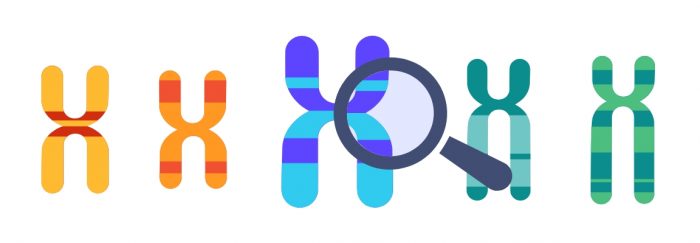Starting a new year means setting new goals to build the best version of ourselves.
The most common resolutions are usually directly or indirectly related to our health and wellbeing. From improving our diet after the copious Christmas meals, avoiding tobacco or alcohol, to starting a new physical activity that helps us to have a better physical and mental state.
However, many times these goals are not achieved, possibly due to lack of motivation or perseverance. So, from tellmeGen we want to invite you to let your own DNA be the motive that allows you to decide how to approach these New Year’s resolutions.
Genetics is one of the factors that have the greatest impact on our health, in addition to our habits and environmental factors to which we are exposed. Knowing our genetics can help us take control of our health because, if we act according to the genetic information we have, we can enhance our strengths and work to optimize our own functioning.

If your 2023 resolution is to eat healthy:
When we talk about eating healthy we mean including in our diet all the nutrients and vitamins necessary for our body to develop its vital functions without any nutritional deficit.
Many people seek to reduce the consumption of foods rich in saturated fats, as they have a high pro-inflammatory impact, and avoid foods that are unhealthy due, for example, to a deficit in an enzyme essential for metabolism, such as lactase and lactose intolerance.
In addition, did you know that a vitamin deficiency is highly associated with our genetics? We explain it below.
Vitamins are molecular complexes which, in general, are the end product of certain precursor molecules. For example, we can know the levels of vitamin A, vitamin B12, vitamin C, vitamin D and vitamin E.
For their proper transformation, one or more chemical reactions are necessary, which are catalyzed by enzymes, which are encoded by genes.
Knowing our genetics allows us to estimate whether we have a tendency to metabolize certain vitamin precursors better or worse and, in this way, we can modify our intake if their activity is lower than the values recommended by health professionals.
If your 2023 resolution is to quit smoking:
Nicotine dependence and smoking remain one of the major causes of preventable deaths due to their harmful impact on health. Nicotine is a parasympathetic stimulant which binds to receptors in our brain responsible for activating the release of dopamine and endorphins, hormones associated with pleasure and happiness.
Increased tobacco consumption increases the number of receptors and, therefore, maintaining the same levels of the happiness hormones requires a greater supply of nicotine. The binding of these receptors triggers a series of withdrawal symptoms such as cravings, anxiety, restlessness, hunger or depression, among others.
As we have seen, receptors play a very important role in this addiction and every molecule in our body is genetically determined. So, knowing the genetic variants of the genes involved in these receptors, such as CHRNA4, CHRNB3, CYP2A6 and others, can indicate the degree of our dependence on nicotine.
If your 2023 resolution is to moderate coffee consumption:
For centuries coffee has been one of the most widely consumed beverages. And, although it has been the subject of many popular beliefs, nowadays there is scientific evidence about its effects on our health.
Not only coffee contains caffeine, but also cocoa, yerba mate, tea and other foods.
Its benefits include antioxidant, diuretic and neuroprotective effects. It is also associated with a lower risk of suffering migraine attacks and headaches and increases sports muscle performance within a few hours of consumption.
However, its excessive consumption (more than 400mg per day) can cause insomnia, anxiety or tremors.
Here again, genetics appears, since the metabolization and effect of caffeine depends on genetically determined molecules. This means that knowing the variants in related genes helps us to better understand why we tend to consume more or less coffee or why it can produce more anxiety than usual.
If your 2023 resolution is to avoid alcohol consumption:
Chronic and/or excessive alcohol consumption is a major public health problem that affects part of the population and a wide range of ages.
In the long term it can favor the onset of chronic diseases such as high blood pressure, cardiovascular and cerebrovascular accidents, mental illnesses, as well as increase the risk of certain cancers. It is also highly linked to social problems and other dependency disorders.
Alcohol metabolism is regulated by enzymes and chemical reactions in different parts of our body. For this reason, there are many genes involved in its degradation and in the effects that the toxic substances derived from its metabolism produce. There are also many genes that to a greater or lesser extent influence the degree to which some people can have greater or lesser self-control when drinking alcoholic beverages. Therefore, having the information about our genetic predisposition to consume alcohol can help us to be aware when moderating or avoiding its consumption.
If your 2023 resolution is to do sports:
Muscle performance is the ability of a muscle to perform a contraction during physical exercise. This trait is genetically determined between 20% and 80%. This percentage varies depending on our oxygen consumption, cardiac output or muscle fiber composition. In the latter, two types of fibers can be differentiated: type I fibers, which contract slowly, and type II fibers, which contract more rapidly. Depending on the percentage of each of them, the individual will be more likely to be a power athlete or an endurance athlete respectively.
Knowing your predominant fibers according to your genes will allow you to practice a sport more in line with your muscles and exploit your sporting abilities.
If your 2023 resolution is to get more rest:
During the hours of sleep our body is charged with energy for the next day, rests the circulatory, nervous and digestive system, releases hormones for muscle growth and cell repair, as well as boosting the immune system.
Nowadays we have a highly stressful lifestyle, it is normalized not to stop doing and producing. But what happens if we don’t get enough rest?
By not reaching the necessary levels of recovery and cellular regeneration, excessive values of stress hormones such as cortisol are reached. This produces a pro-inflammatory microenvironment, as well as fatigue and chronic physical and mental tiredness, increasing the risk of suffering from cardiovascular and mental diseases, some types of cancer and other pathologies.
At the genetic level there is also something to highlight, since all these biological processes are associated with genes, so knowing our genetic variants can help us to know our body’s ability to rest well during the hours of sleep.
Now that we have mentioned what is behind all these goals… Do you dare to know your genetics and thus have the reason to achieve your goals for the next 2023?



